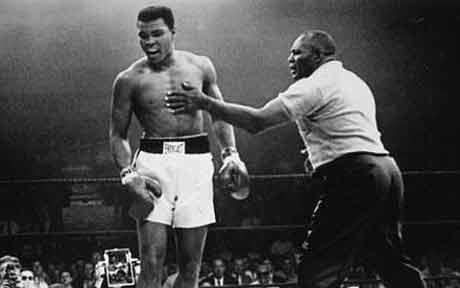Cassius Clay who became the legendary Muhammad Ali ‘paved way for Barack Obama’ according to legendary promoter Bob Arum
Fifty years ago this month, a 17-year-old with flashing fists and slick dancing skills first appeared on the boxing radar, as the United States Golden Gloves winner in the light-heavyweight division. His name was Cassius Marcellus Clay.
That victory was to propel Clay to selection for the US team for the Rome Olympics the following year. By the end of the Games, Clay, then 18, was an Olympic light-heavyweight gold medalist, and at the start of a journey in which he would be the three-time heavyweight champion of the world and one of the most recognised figures on Earth.
Over the last 50 years, Clay, and in turn Muhammad Ali following his conversion to Islam in 1964, has created deep lines in history. Ali still makes headlines whatever he does, albeit silently and slowly these days, with Parkinson’s disease.
He is still talked of as ‘The Greatest’, a title he gave himself, and to which others slowly came to see and believe themselves. In the UK and US, his name creates a sporting reverence. The BBC voted him Sports Personality of the 20th Century; Sports Illustrated named him Sportsman of the Century.
Bob Arum, Ali’s erstwhile promoter from his turbulent early career in the Sixties, speaking exclusively to The Daily Telegraph, goes even further. Arum believes that Ali will go down in the history of American civilisation as a major catalyst for change.
“Ali paved the way for Barack Obama to be elected, in 2008, as the first black President of the United States,” said Arum, from the offices of his company, Top Rank Inc, in Las Vegas.
“I really do think that without Ali, there wouldn’t be an Obama as President. The impact he had, the evolution he brought led people to accept the integration of blacks into American society. Ultimately, it induced people to vote for a black man for President of the United States.
“That’s how I see it, as someone in their late seventies who has seen the whole evolution of racial integration happen in the US. Ali’s legacy transcends anything he did in the ring, because what he did has become a real, integral part of the nation’s development.”
“Ali will always be the greatest. He was and remains, a genius. He taught me everything I know about promoting, and then some more. He was a natural entertainer, a natural promoter, and one of the greatest athletes we are ever likely to see on this planet.
“But he touched people, he appealed to so many. That impact, at that time, the change he brought about in the way people came to see things, should not be underestimated.”
Arum had been a young lawyer in the Justice Department of the United States Government during the Kennedy administration, and a year after JFK’s assassination in 1963, went into private practice with a law firm in New York.
While investigating some malpractice in boxing, Arum met an associate of Clay’s and ended up being involved in promoting Ali’s fight against George Chuvalo in 1966, then Henry Cooper and Brian London, here in the UK, later that year.
Arum is still involved with the top fighters of today, currently promoting the world’s No 1 pound for pound fighter Manny Pacquiao, who meets Briton Ricky Hatton in Las Vegas on May 2.
Arum said: “We had great black athletes like Joe Louis, who was admired. He was servile and went along and said the right things. We had Jackie Robinson, the first black player to break the colour barrier in baseball.”
Robinson’s 1947 Major League debut with the Brooklyn Dodgers ended approximately 60 years of baseball segregation.
“They took strides, but they did not have the same impact as Ali did,” Arum said. “He actively refused to live with restraints. He had a spirit that could not be tamed.”
“When he refused to fight the Vietcong, and spoke out about it, which saw his boxing licence and then his passport taken away, people saw his inner strength. People saw a real person, who refused to ignore matters when he saw his race was being denigrated.”
The bond continues between Arum and Ali, and their families. Do they still speak? “Yes, we do,” Arum said. “Rest assured his memory is a powerful one.”
“My wife and his wife were raising funds for the Muhammad Ali Center in Louisville and they held a fund-raiser at my house about three years ago.”
“We had a lavish dinner, many guests, and I made a speech and recounted some incidents about Ali, and afterwards, he called me over. ‘You made a few mistakes there’ he whispered to me, and recounted every error I had made.”
Arum falls silent for a moment. As if in prayer. “He is a very special human being indeed. I really think that when history books are read in 50 years’ time, that there will be a significant paragraph or even chapter about Muhammad Ali in the history of the American civilisation.”
